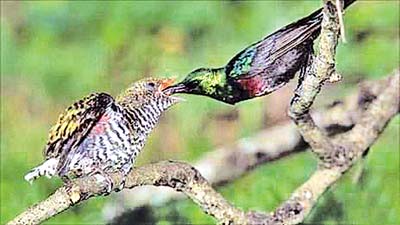|

Extra incubation time lets cuckoo chicks come out early
A cuckoo has a remarkable ability to hold its egg inside it for an
extra 24 hours before releasing it into a host bird's nest, researchers
have found.
They say this "internal incubation" lets a cuckoo hatch before its
nest mates, chuck them out and have the food foster parents bring all to
itself.The find may help understand how cuckoos evolved as brood
parasites - birds that lay eggs in other nests.

The team published the study in the Royal Society Proceedings B
journal.Many species of cuckoos are brood parasites, relying on other
species to bring up their young.
If foster parents do not toss "the intruder" out before it hatches,
their own offspring will often end up on the ground, evicted by the
squatter.To be able to survive in the host family, "you have to hatch
before the other chicks hatch, that's crucial as that gives you a head
start", Tim Birkhead of the University of Sheffield, who led the study,
told BBC News.
Ornithologists have long known about this, as well as about the
curious fact that cuckoo embryos in recently laid eggs appear more
developed than those in eggs of other species.Professor Birkhead said
there were numerous reports in the literature that dated back to the
18th and 19th centuries about egg collectors, who were stunned to see a
lot more advanced embryos while they were blowing cuckoo eggs.Scientists
have tried to resolve the mystery for decades - the idea of internal
incubation was first suggested back in 1802. But it seemed so out of the
ordinary that the scientific community ended up ignoring it - until now.
"For a lot of people that seemed extremely unlikely because they didn't
think that cuckoos or any other birds could hold on to their eggs once
they were ready to be laid," said Professor Birkhead.
"But our results show that that's clearly what happens."
To test their idea, the British scientists decided to mimick the
natural incubation process.
They took recently laid eggs of a European cuckoo and incubated them
for 24 hours at 40 degrees - the bird's body temperature.
They then examined the embryos under a microscope.
"Sure enough, the embryos seemed to be much more advanced than those
in the eggs of any other species that we looked at," said Professor
Birkhead. To check whether this was a strategy for giving the chick a
head start, the team took eggs of another species - a zebra finch.
The results confirmed the scientists were on the right track.
"When we incubated those zebra finch eggs for an extra 24 hours,
mimicking the situation with cuckoo, their embryos were at exactly the
same stage as the cuckoo embryo is when it's laid," said the
ornithologist.
He explained that though a cuckoo's egg would spend only an extra 24
hours in the female's body, hatching advantage would actually be about
31 hours, as inside the mother the embryo developed much more rapidly
than in the nest.
"If they didn't have this internal incubation and the cuckoo chick
either hatched after or at the same time as the host chick, it would be
much less successful at evicting them from the nest and therefore much
less likely to monopolise all the food," added the scientist.
Professor Birkhead's colleague Nicola Hemmings, also of the
University of Sheffield, called the discovery "amazing".
"It certainly changes our perception in terms of how the cuckoos have
evolved, to be dumping their eggs in other nests, and it gives us some
idea about why they've evolved this parasitic strategy," she told BBC
News.
(Courtesy: BBC) |

